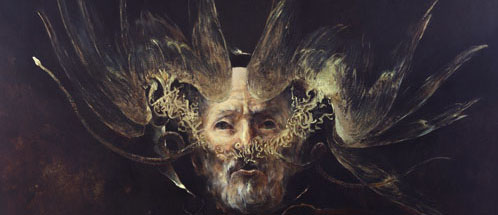
For a band as massive as Behemoth, five years in between albums may seem like a long time, but when that time period is comprised of a battle with cancer, no one can say it is not understandable. It is now 2014, and front man Nergal has triumphed over the insidious disease. Arising whole and healthy once more, he and his talented Polish bandmates have just released their tenth studio album in the form of The Satanist, released February 3rd on Nuclear Blast Records (in the U.S.A.).
Behemoth’s past releases were monuments to the combined power of death and black metal. If there was one thing that pervaded their albums in the 2000s, though, it was Nergal’s propensity to keep his vocals on overdrive 100% of the time. Laced with effects, their overall delivery often loses effectiveness as a result. This was a shame, because Behemoth always showed an excellent grasp of songwriting dynamics. For The Satanist, Behemoth spent months in the studio, primarily using Daniel Bergstrand as their producer. The result is a far more balanced, dynamic album that has lost none of the ferocity of their prior efforts.
The Satanist may, in fact, be their best overall album. Nergal’s vocals sound much more organic, as though his own triumph over death has lent him a power no computerized histrionics can match. The dynamic between slow and fast on the album is razor sharp. Take the opening track “Blow Your Trumpets Gabriel”. A careful, menacing start gives way to the trademark blasting of drummer Inferno, who lays a foundation for a song whose touches of keys, orchestra, and choral voices lend it the biblical weight of its subject matter. Blasting tracks such as “Furor Divinus” and “Amen” are more typical Behemoth fare, their blistering pace sure to please fans. Where Behemoth truly shines on this record, though, is in their more sonically diverse compositions. The excellent title track features one of the coolest bass lines you will hear in this kind of metal. The atmosphere bleeds the very light of Lucifer, which Nergal has been trying to make us see for twenty years now. Eerie soundscapes add to the song’s haunting quality, as Nergal bellows “I am the great rebellion”. The song then shifts into a triumphant guitar solo, whereupon the tempo is abruptly jolted into light speed by the sure hands and feet of Inferno (drummer). Orchestral instrumentation lilts over the blast, perfectly integrated into the production.
“Ora Pro Nobis Lucifer” is another highlight, reminiscent of “Chant for Ezkaton 2000”, what with its head-nodding pace and pure heavy metal might. Again, the soloing is effective, as both the leads and the riffs are far better elucidated than on past albums. Behemoth is still going for the throat, but they are taking a much more subtle route to the soft meat of your neck. “In the Absence Ov Light” begins with a blast, but is augmented by a cool spoken word piece by Polish dramatist Witold Gombrowicz. Its atheistic, enlightening message speaks Nergal’s philosophical language to a ‘T’. The track built around this piece goes through a variety of tempos and moods. Album closer “O Father O Satan O Sun” is not the first time Behemoth has ended an album with a slower, mood-filled epic. It is, however, the best such track they have written. Not unlike Marduk’s transcendent “Accuser Opposer” off of Rom 5:12, the song is built on a grand yet unconventional foundation, truly showing off Behemoth’s capabilities to deviate from their own formula. The lead at 2:40 is pure rock-n-roll. The song itself is quite simply an anthem; Nergal’s black metal has always been more about love than hate. Nowhere is this more convincing than right here on “O Father O Satan O Sun”, where Nergal speaks to the triumph of inner enlightenment. He stomps on the neck of ignorance and dogma while glorifying the freedom this brings to the individual, expounding his intent in a fashion never before equaled by Behemoth, and rarely equaled at all in metal this extreme. CrypticRock gives this album 4.5 out of 5 stars.







No comment